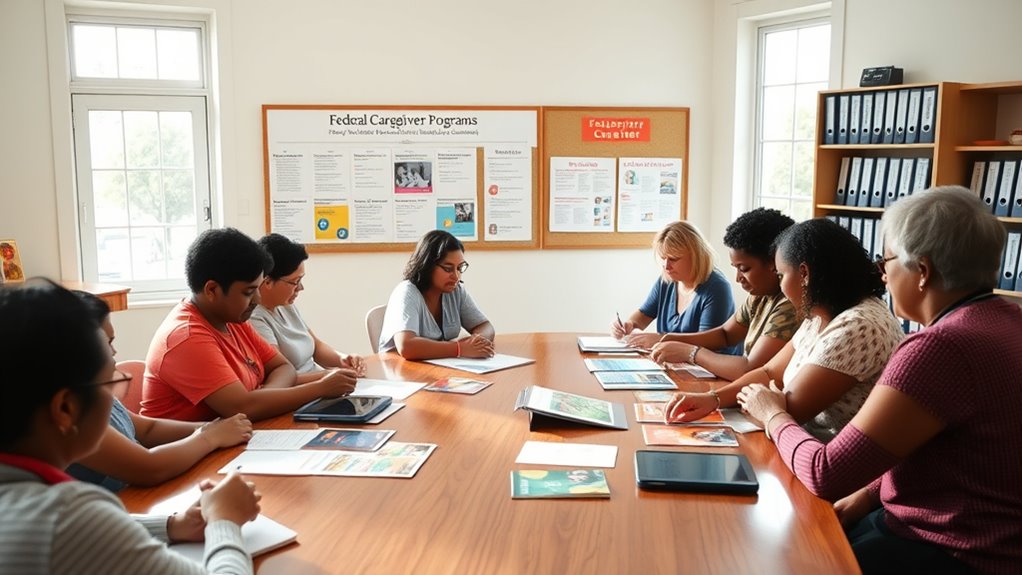Federal resources for caregivers offer critical support to help you manage your responsibilities. You can access respite care services that provide temporary relief, financial assistance for supplies and home modifications, and job protections through laws like FMLA. Programs like the NFCSP and Medicaid Waivers are designed to make caregiving more affordable and manageable. To learn more about these helpful options and how to access them, keep exploring your available resources.
Key Takeaways
- The National Family Caregiver Support Program (NFCSP) offers grants and services to assist caregivers nationwide.
- Respite care services funded by federal programs provide temporary relief to prevent caregiver burnout.
- Medicaid Waivers and VA Aid & Attendance offer financial assistance to offset caregiving expenses.
- The Family and Medical Leave Act (FMLA) protects caregivers’ jobs during medical or emergency leave.
- Federal resources include educational materials, eligibility guidance, and application support for caregiver assistance programs.

Caring for a loved one can be both rewarding and challenging, but federal resources are available to support you every step of the way. One essential service designed to give you a break and help manage your responsibilities is respite care. Respite care provides temporary relief by offering short-term caregiving assistance, allowing you to rest, attend to personal needs, or handle emergencies. These services can be delivered in various settings, such as adult day programs, in-home care, or overnight stays at care facilities. Accessing respite care guarantees you don’t burn out and helps you maintain your well-being, which is critical for providing consistent, quality care to your loved one. Federal programs like the National Family Caregiver Support Program (NFCSP) help connect you with local respite services tailored to your needs. Additionally, many of these services are subsidized or partially covered, making respite care more accessible and affordable.
Alongside respite care, financial assistance plays an essential role in easing the financial burden that often accompanies caregiving. The costs of medical supplies, home modifications, transportation, and other related expenses can add up quickly. To help address this, several federal resources offer financial assistance specifically for caregivers. Programs such as the Medicaid Waivers and the Veterans Affairs Aid & Attendance benefit provide funding or stipends that you can use to offset some of these costs. The Family and Medical Leave Act (FMLA) also offers job protection, allowing you to take unpaid leave without risking your employment, giving you peace of mind during critical times. Furthermore, the Administration for Community Living (ACL) administers grants and resources aimed at supporting caregivers with financial aid options, educational materials, and access to services that can reduce out-of-pocket expenses.
It is also helpful to be aware that understanding entertainment and parks options in your area can provide additional avenues for relaxation and respite, helping to improve your overall well-being. You should know that applying for these resources often involves a straightforward process, and eligibility criteria are designed to prioritize those in greatest need. Many programs require documentation of your caregiving role, financial status, and the condition of your loved one. Once approved, these resources can greatly lighten your load, both emotionally and financially. They enable you to focus on providing quality care without feeling overwhelmed by costs or exhaustion. Federal support is here to guarantee you don’t have to face these challenges alone. By taking advantage of respite care and financial assistance programs, you give yourself the necessary space to recharge and continue caring effectively. Ultimately, these resources exist to empower you so you can give your loved one the best possible care while maintaining your own health and well-being.
Frequently Asked Questions
How Can Caregivers Access Financial Assistance Programs?
You can access financial assistance programs by applying for federal grants and caregiver stipends through government websites like the Administration for Community Living and your state’s health department. Check eligibility criteria, gather necessary documentation, and complete the application process online or in person. Stay informed about new opportunities by signing up for alerts and newsletters. These resources help ease your financial burden while providing essential support for your caregiving responsibilities.
Are There Support Groups Available for Caregivers?
Yes, there are support groups available for caregivers. These groups offer caregiver peer support, helping you share experiences and gain emotional strength. Support group benefits include reducing feelings of isolation, providing practical advice, and fostering a sense of community. You can find local or online caregiver support groups through healthcare providers, community centers, or national organizations. Joining one can make a significant difference in managing caregiving challenges.
What Training Resources Are Provided for New Caregivers?
Did you know that over 60% of new caregivers report feeling unprepared? You can access federal caregiver training and educational resources designed to boost your confidence and skills. These programs often include online courses, workshops, and printed materials tailored to your needs. By utilizing these resources, you’ll gain essential knowledge on caregiving tasks, enhancing your ability to provide quality care and reducing stress.
How Do Caregivers Apply for Respite Care Services?
To apply for respite care services, you should first check your eligibility for the respite program in your state. Then, complete the caregiver certification process, which typically involves submitting documentation of your caregiving role. You can usually apply online through the program’s website or contact local agencies for assistance. Once approved, you’ll receive details on accessing respite services, giving you needed relief and support.
Are There Legal Rights and Protections for Caregivers?
Yes, you have powerful legal protections and caregiver rights that shield you from unfair treatment and burnout. These laws are like a mighty fortress, defending your right to fair treatment, workplace accommodations, and access to essential resources. You shouldn’t feel overwhelmed or helpless—your legal protections are there to guarantee you’re supported, respected, and able to care confidently. Know your rights, stand up for them, and let these safeguards be your shield.
Conclusion
With so many federal resources available, you don’t have to face caregiving alone. From financial assistance to support networks, help is within reach. Are you taking full advantage of these opportunities to make your caregiving journey easier? Remember, seeking support isn’t a sign of weakness but a step toward providing better care—for yourself and your loved ones. Reach out today and discover the resources that can make a real difference in your life.









